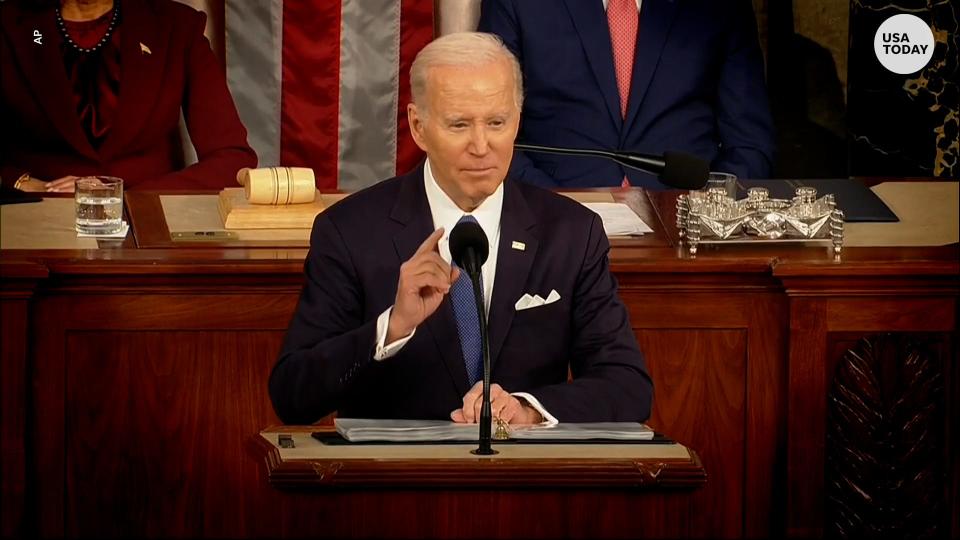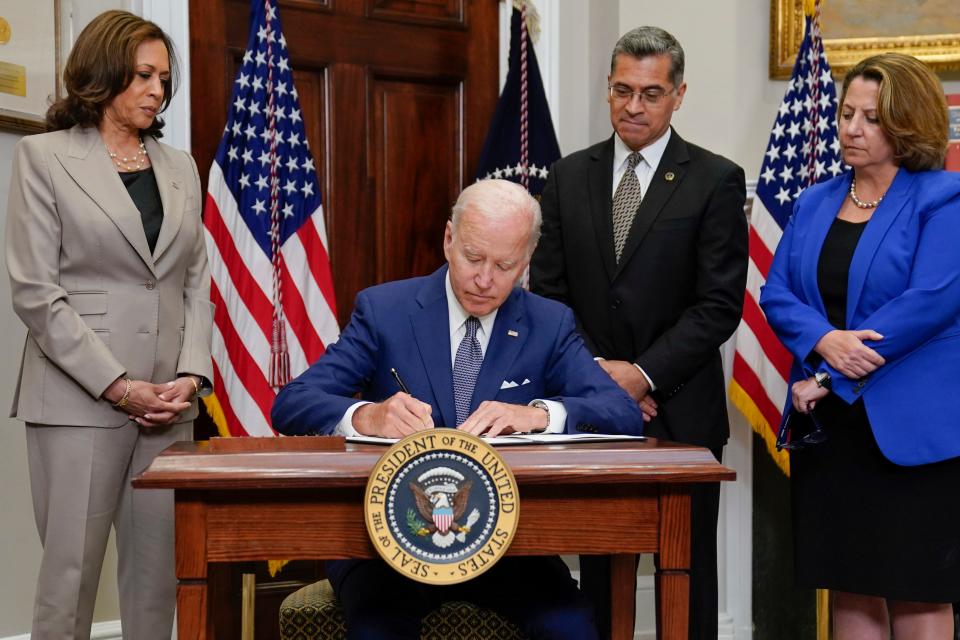Is your mom’s nursing home owned by private equity? Biden administration wants you to know
- Oops!Something went wrong.Please try again later.
- Oops!Something went wrong.Please try again later.
The Biden administration today called for nursing homes to provide a complete picture of their owners and operators, proposing a new federal rule central to the president’s plans to improve the quality of care and contain healthcare costs at the facilities.
The announcement comes a month after a report from the federal Government Accountability Office called for Medicare and Medicaid regulators to collect more information about nursing home ownership and to share it, in plain terms, with consumers.
In a press call, U.S. Health Secretary Xavier Becerra characterized the draft rule as evidence that the president is serious about reforming nursing homes, noting he mentioned them in both of his State of the Union addresses.
“We all know the COVID-19 pandemic graphically exposed long-standing systemic challenges in our nation’s nursing homes,” Becerra said. “One of the greatest concerns: Quality seems to be going down in some of our nursing homes, but the cost of those nursing homes continues going up.”
Mark Parkinson, president of the American Health Care Association, described the rule as “a distraction from the real issues" affecting the quality of care in nursing homes, such as Medicaid payments that he said are too low and staffing challenges.
“We support transparency and appreciate the administration’s efforts to assist families in making more informed decisions," said Parkinson for the nursing home industry’s largest trade group. "However, focusing on ownership and private equity is a red herring.
The United States spends more than $90 billion annually on nursing home stays covered by the two federal insurance programs: Medicaid for people with low incomes and Medicare for people who are elderly or have a disability.
Decades of academic research has found that ownership can significantly affect quality of care.
“It is important to track given the extremely large public investments we make in this care for users who often are vulnerable,” said Ashvin Gandhi, a health economist from the University of California, Los Angeles. “We should understand what we’re buying with our money.”

The rule proposed by the Biden administration was published in the Federal Register, which allows the public to submit comments. That feedback could inform revisions.
Unlike the other major trade organization, a group representing nonprofit aging-care providers, LeadingAge, said it fully supports Biden’s plan to collect more detailed ownership information.
“We agree with the administration that ownership and financing of nursing homes should be transparent to help ensure that owners or associated businesses do not profit at the cost of quality care,” said LeadingAge President Katie Smith Sloan in a statement. “The proposed disclosure and reporting requirements set out in today’s proposed rule are a step in the right direction.”
The federal agency tasked with regulating nursing homes, the Centers for Medicaid and Medicare Services (CMS), has not tracked detailed ownership even though it has had the authority to do so for more than a decade under the Affordable Care Act. Nursing homes could be required to submit new information about direct and indirect owners as soon as this summer.
Updated regulatory paperwork will require nursing homes to disclose whether they are linked to private equity firms or real estate investment trusts in addition to naming all businesses operating within the building or providing consulting services. For instance, a nursing home might appear unprofitable to regulators even though a related business running the in-house pharmacy is profitable. Or, a nursing home might appear unprofitable while making large rent payments to a profitable corporate landlord.
With detailed ownership information, CMS Deputy Administrator Jonathan Blum said the agency will be able to test industry claims that nursing homes cannot afford the president’s reform proposals, including new staffing mandates expected this spring.
Dying for Care: Read USA TODAY's full investigation
Nursing homes that are for-profit, part of a chain, or owned by private equity firms all tend to provide worse care to residents, Gandhi and other researchers have found. USA TODAY’s Dying for Care investigation last year revealed a pattern of high COVID-19 death rates across one Midwest nursing home chain owned by a real estate investment trust – a business model that the administration told USA TODAY had not previously been on its radar. It was included in the rule proposed Monday.
“Decisions that directly affect nursing home quality – such as those related to staffing or quality improvement – can be made at the corporate level and potentially affect some or all nursing homes within the chain,” read the recent report from GAO, which has called for more ownership disclosures since 2014.
As noted in a September 2022 congressional hearing, some of the nation’s largest chains have complex ownership structures that obscure who makes which decisions and where payments from tax dollars go. The data currently collected by regulators sometimes misses business entities profiting from nursing homes and does not always make clear the role of each partner.
“At the moment, we don’t have the ability to accurately tell you if nursing homes are unprofitable, slightly profitable or highly profitable,” said Gandhi, who researches the impact of ownership on nursing home quality and staffing levels. “We have no idea because we don’t see all the places the money is going.”
He echoed a 2022 report from the National Academies of Sciences, Engineering, and Medicine, which said ownership and financial information would be crucial to designing policies to encourage improved care.
Becerra committed to sharing the new ownership information publicly with consumers once it is available. The announcement in the federal register, however, said decisions about how to share the information will not be decided until after the rule is finalized.

Consumers likely will find the information in the federal government’s online score card known as Nursing Home Care Compare.
It includes a quality rating for the facility and a long list of names – any business or person with at least a 5% ownership stake. It does not make clear who has real decision-making authority and whether the nursing home is part of a chain. It does not show other facilities run by the same operator or their scores so that a family can see how many have good outcomes or bad.
The GAO said federal regulators should improve the information provided to consumers and do so in plain language, not detailed lists without relevant context. The report cited USA TODAY’s investigation of one chain as evidence of growing public interest in who runs nursing homes.
Consumer advocates have said that while transparency is important, Biden’s reforms should be paired with increased enforcement of quality standards.
“The heart of it, the whole purpose of this effort, has to be that CMS and the state (inspection) agencies are using this information to monitor ownership groups and holding them accountable for quality care across their facilities, whether it be two facilities or hundreds of facilities,” said Richard Mollot, executive director of the Long Term Care Community Coalition.
Blum said CMS plans to use the new ownership information to better track when nursing homes change ownership, which he said often precedes declines in care quality. Large operating chains, landlords and investors frequently buy and sell “investment-grade” nursing homes, which often leads to changes in leadership, policies and staffing levels.
Neither Blum nor Becerra said whether the agency would use expanded ownership information to enforce performance standards at a chain level.
CMS, and the state survey agencies that conduct inspections for them, typically focus on problems at one nursing home at a time. The regulator has requested Congress provide explicit authority to take enforcement actions against owners with a pattern of poor quality.
In some cases, owners have been able to avoid civil penalties by closing a nursing home. Regulators would like to be able to deny payments to whole nursing home chains with poor track records or a history of fraud, rather than having to issue those penalties facility by facility, according to the GAO report.
Blum said that the government would not hesitate to issue financial penalties to nursing homes or stop payments to facilities that did not provide complete or accurate information about their ownership structure under the new rule.
“If you don’t comply,” he said, “you can’t participate” in Medicaid or Medicare.
Jayme Fraser is a data reporter on the USA TODAY investigations team. Contact Jayme at jfraser@gannett.com, @jaymekfraser on Twitter and Facebook, or on Signal and WhatsApp at (541) 362-1393.
This article originally appeared on USA TODAY: More nursing home ownership info intended to aid consumers, regulators

